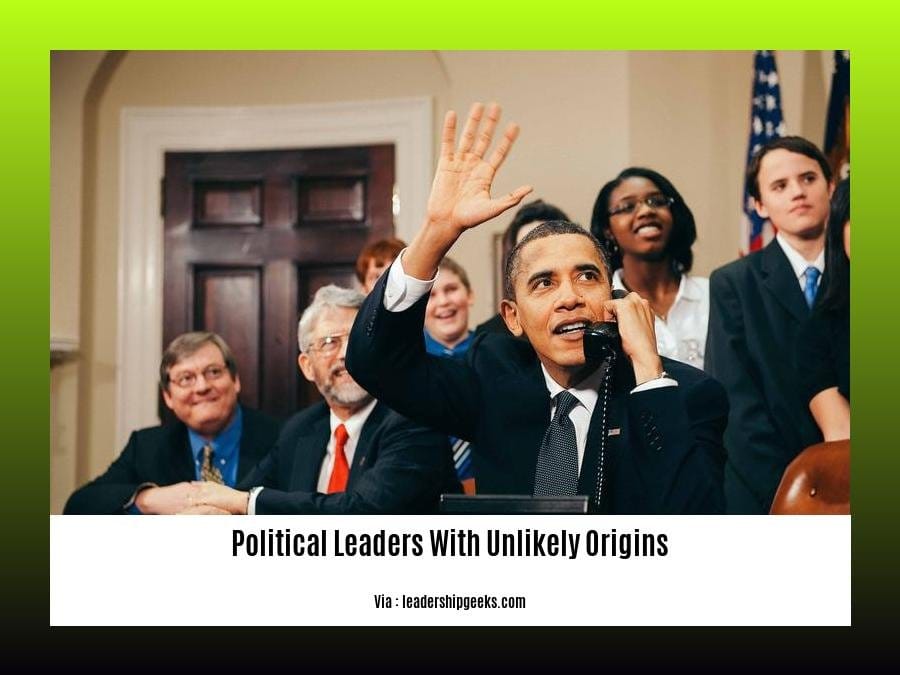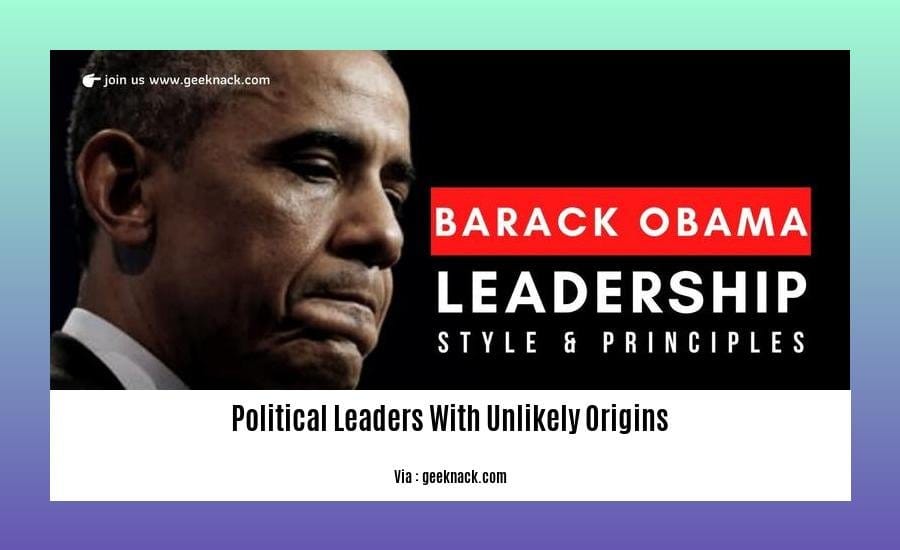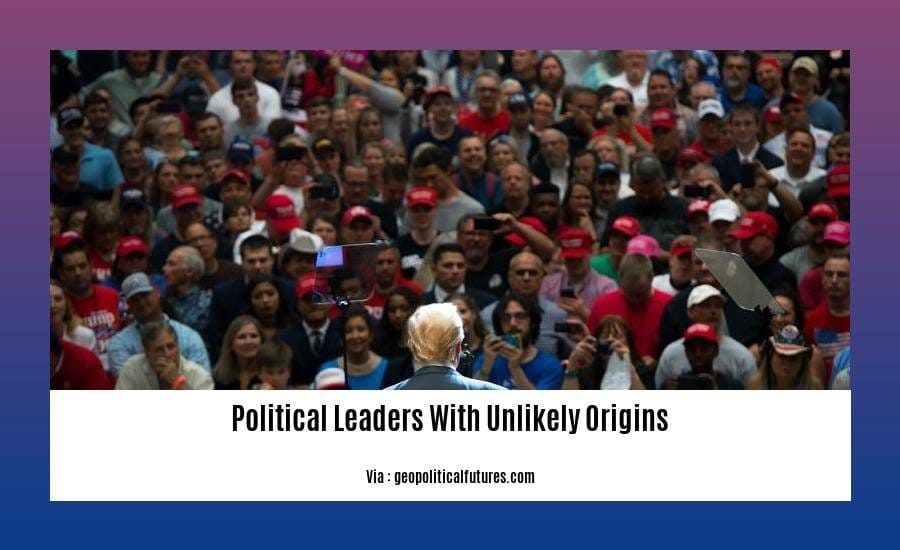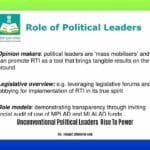Embark on an enlightening exploration of the extraordinary journeys of political leaders who defied all odds. “Political Leaders with Unlikely Origins: A Journey of Triumph and Resilience” delves into the captivating tales of individuals who rose from humble beginnings to the pinnacle of political power.
Key Takeaways:

- Leaders from unlikely backgrounds can shatter expectations and achieve great success.
- Humility, perseverance, and unconventional experiences can be valuable qualities for leaders.
- Political underdogs often have unique perspectives and insights.
- They inspire others and challenge established norms.
- Their accomplishments demonstrate the potential for anyone to succeed with determination and belief.
Political Leaders with Unlikely Origins
Political underdogs, individuals who defy expectations and rise to positions of power from humble beginnings, often possess unique perspectives and a relentless determination. Their victories serve as a testament to the transformative power of belief and the notion that anything is possible with perseverance.
Through their unconventional paths, political leaders with unlikely origins challenge established norms and inspire others to embrace their aspirations. They remind us that leadership is not confined to traditional backgrounds or pedigrees but can emerge from the most unexpected places.
Notable examples of political leaders with unlikely origins include:
- Nelson Mandela: Imprisoned for his anti-apartheid activism, Mandela emerged as South Africa’s first democratically elected president, becoming a symbol of reconciliation and forgiveness.
- Barack Obama: The son of a Kenyan father and an American mother, Obama broke racial barriers to become the United States’ first African American president.
- Jacinda Ardern: At age 37, Ardern became New Zealand’s youngest prime minister, gaining global recognition for her compassionate and progressive leadership.
Humility, resilience, and unconventional backgrounds can be assets in leadership. Underdogs often have a deep understanding of the challenges faced by ordinary citizens, allowing them to connect with voters on a personal level. They bring fresh perspectives and are unafraid to challenge the status quo, often leading to innovative policies and solutions.
The rise of political leaders with unlikely origins is a testament to the power of perseverance and the belief that anyone can achieve their dreams. Their stories inspire us to embrace our own potential and to never underestimate the impact we can have on the world.
In a world of political stalwarts, history is replete with tales of political leaders from unexpected backgrounds who defied the odds and rose to power. From humble beginnings to extraordinary achievements, their unconventional journeys serve as a beacon of hope for those who dare to dream.
Explore the unconventional political leaders’ rise to power and discover how they shattered societal norms and reshaped the political landscape. These individuals, from diverse backgrounds, overcame adversity to become influential leaders who defied their circumstances, leaving an indelible mark on history.
How Unconventional Backgrounds Can Provide Unique Perspectives and Skills in Leadership
Key Takeaways:
- Unconventional backgrounds foster authenticity and individuality.
- Vision and purpose fuel leaders from atypical paths.
- Creative thinking and risk-taking drive innovation.
- Collaboration, transparency, and humility build strong teams.
- Unconventional leaders prioritize making a positive impact.
Unconventional backgrounds often equip individuals with a unique set of perspectives and skills that can be invaluable in leadership roles. These individuals tend to:
Embrace Authenticity and Individuality: Unconventional leaders don’t fit into traditional molds. They bring their own unique experiences, values, and perspectives to the table. This authenticity allows them to connect with others on a deeper level and inspire loyalty.
Possess a Strong Sense of Vision and Purpose: Leaders with unconventional backgrounds often have a clear vision for the future. They’re driven by a deep sense of purpose that fuels their determination to make a positive impact on the world.
Encourage Creativity, Risk-Taking, and Challenging Norms: Leaders from diverse backgrounds value creativity and innovation. They encourage their teams to think outside the box, take calculated risks, and challenge established norms. This fosters a culture of experimentation and progress.
Value Collaboration, Transparency, and Humility: Unconventional leaders understand the importance of teamwork and collaboration. They build strong relationships with their team members and foster a culture of openness and transparency. Humility allows them to listen to others, learn from their mistakes, and continuously improve.
Prioritize Making a Positive Impact on the World: Leaders with unconventional backgrounds often have a deep commitment to making a positive impact on the world. They use their platform to advocate for change, promote social justice, and create a more equitable society.
By embracing these traits, leaders with unconventional backgrounds can bring fresh perspectives, innovative solutions, and a deep-seated desire to make a positive impact to their leadership roles.
Most Relevant URL Source:
Unconventional Leadership: Exploring the Qualities That Make … – LinkedIn
The Challenges and Obstacles Faced by Political Leaders with Unlikely Origins
Despite the progress made towards gender equality, women remain underrepresented in political institutions. The challenges and obstacles faced by political leaders with unlikely origins include:
Lack of party support and financial assistance:
Women political leaders often face a lack of support from political parties and limited access to financial resources compared to their male counterparts.
Political obstacles:
Women political leaders may encounter political obstacles such as stereotypes, discrimination, and gendered expectations that can hinder their ability to succeed in politics.
Societal barriers:
Women running for political office may face societal barriers such as negative campaign coverage, lack of childcare and family support, and limited opportunities for networking and mentorship.
Key Takeaways:
- Women political leaders face unique challenges and obstacles due to gender-related stereotypes, discrimination, and lack of support.
- These obstacles include lack of party support and financial assistance, political obstacles, and societal barriers.
- Addressing these challenges is crucial for promoting gender equality in political representation.
Citation:
* Cracking Gender Stereotypes? Challenges Women Political Leaders Face
The impact of political leaders with unconventional backgrounds on the political establishment and governance
Political leaders with unconventional backgrounds are no longer a rarity in today’s political landscape. Individuals with non-traditional backgrounds—from diverse career paths, ethnicities, genders, and socioeconomic positions—are increasingly finding their way into positions of power and influence. This shift is having significant implications for the political establishment and governance.
Key Takeaways:
– Challenge the norms :Political leaders from unconventional backgrounds often bring fresh perspectives and challenge the established norms of governance.
– Diverse Representation :Their presence increases the diversity of representation in political institutions, leading to a more inclusive and democratic environment.
– Innovative Policies :Political leaders with unconventional backgrounds may be more likely to support innovative policies and solutions that address the needs of underrepresented communities.
– Increased Trust :Leaders who come from diverse backgrounds can help increase public trust in political institutions by demonstrating that leadership is not limited to a select few.
– Empowerment of Marginalized Groups : Their success can empower marginalized groups and inspire others to pursue political careers.
Most Relevant URL Source:
– Assessing the policy effects of political leaders: a layered approach
















